Kars Summer Garden Check: Prevent Expensive Plant Loss
Ready to keep your Kars garden looking its best this summer without breaking the bank on replacement plants? Request your free estimate today for expert garden care help!
Summer Garden Survival Essentials:
- Water deeply early morning, checking soil moisture first.
- Apply 2-3 inches of mulch to retain moisture and cool soil.
- Weed frequently while weeds are small.
- Regularly inspect plants for pests and diseases.
- Fertilize sparingly during extreme heat, focusing on containers/veggies.
- Keep lawns mowed higher (3 inches) during dry periods.
- Ensure container plants stay hydrated.
- Tidy up garden debris promptly.
Introduction: Keep Your Kars Garden Thriving This Summer (and Save Money!)
Hello Kars! Isn't summer near the Rideau just the best? After the long Ottawa winter, we all deserve to kick back and enjoy our beautiful yards, whether we're tending flower beds or just relaxing on the patio. But hold on… is that prized hosta looking a bit droopy after that last heat wave? Are you noticing more mystery spots on your leaves than usual?
Our lovely Ottawa summers, swinging from glorious sunshine to sudden downpours or those *sticky*, humid days, can really test our gardens. Whether you're nurturing your green space in Kars, Marionville, or over in Osgoode, you’ve put effort and probably a fair bit of cash into your landscaping. Seeing plants struggle, wilt, or worse, needing complete replacement, is frustrating *and* costly. Nobody wants to buy the same shrub twice in one year, right?
Think of this guide as your friendly summer garden check-up reminder. It’s not about adding chores; it’s about smart prevention! A little attention now – like adjusting your watering schedule for the heat, peeking under leaves for sneaky pests before they throw a party, or ensuring your mulch is doing its job – can prevent bigger problems later. It’s the secret weapon to keeping your garden looking lush, avoiding unexpected plant hospital bills (aka replacement costs), and *saving* you money down the road. Let’s work together to keep those Kars gardens thriving all season long! Maybe find some inspiration from our Google Business Profile reviews.
Need help keeping your garden healthy and beautiful?
Get Professional Help With Your Garden CareDecoding the Ottawa Summer Sizzle: Local Climate & Soil Challenges
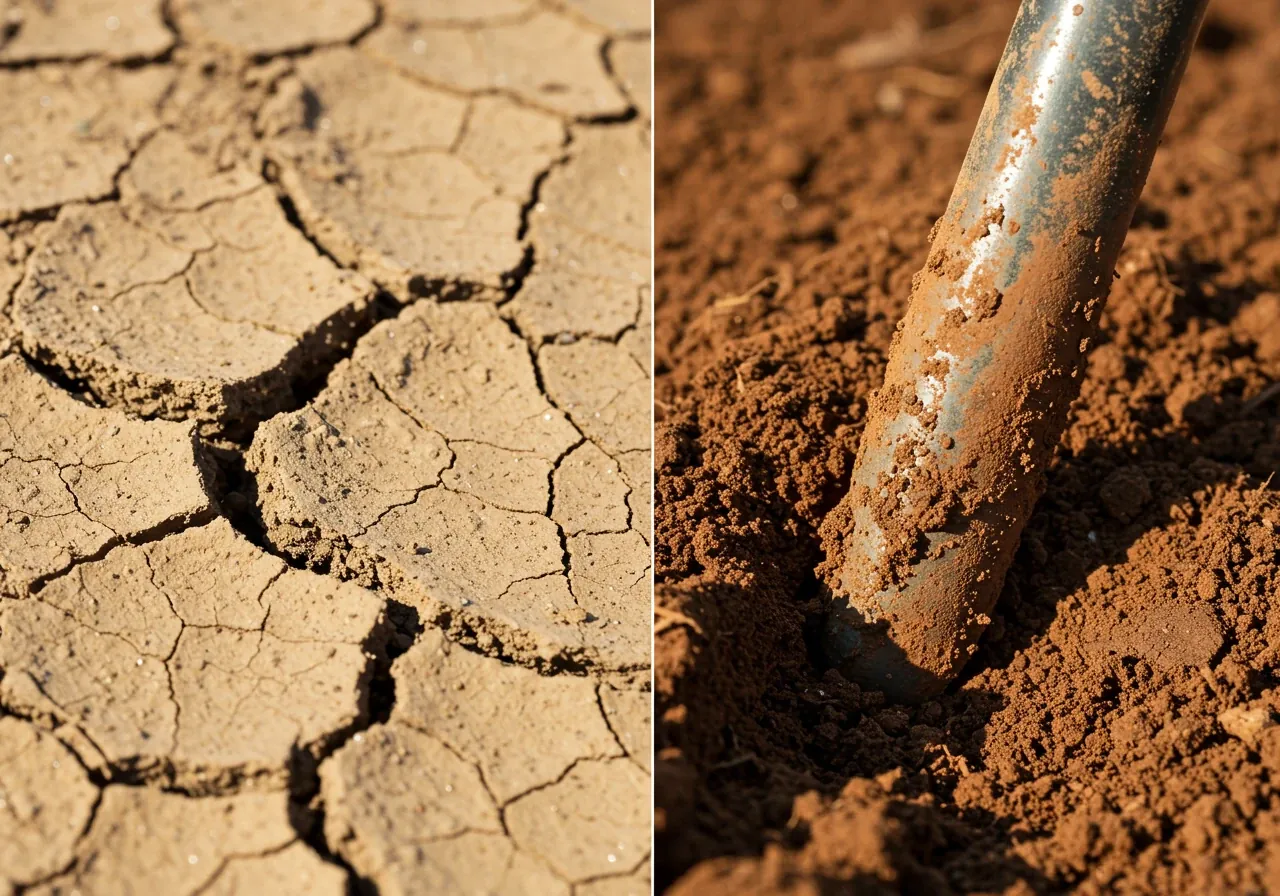
Ah, Ottawa summers. One minute we're basking in glorious sunshine near the Rideau River, the next we're dodging a sudden thunderstorm or wilting in humidity that feels thick enough to swim through! While we love the warmth after our long winters, this "exciting" weather mix brings unique challenges for our gardens and landscaping, whether you're in Kars, Greely, Richmond, or anywhere in between.
Let’s break down the double whammy: climate *and* soil.
The Heat is On (And Sticky!)
Ottawa summers can swing from pleasant warmth to serious heat waves, often paired with high humidity. What does this mean for your plants?
- Thirst Quenchers Needed: Intense heat evaporates water *fast* from both soil and leaves. Plants wilt easily, growth can stall, and lawns can turn brown quicker than you can say "pass the iced tea." Consistent, deep watering becomes crucial. For tips on water conservation, check the City of Ottawa's water conservation page.
- Stress Test: Just like us, plants get stressed by extreme heat. This makes them more vulnerable to pests and diseases. Think of it as their immune system being a bit run down.
- Fungal Frenzy: Humidity is basically a party invitation for fungal diseases like powdery mildew or black spot. Good air circulation around plants is key to crash that party. Keeping plants healthy overall helps them resist these issues; for shrubs, timing is important – you can review some useful Richmond Summer Shrub Pruning Tips for Healthy Gardens to help keep them in top shape.
Getting Down to Earth: Soil Struggles
Beneath our feet lies another challenge. Ottawa region soils vary, but many areas, including parts of Greely and Metcalfe, grapple with heavy clay. Others might have pockets of sand.
- Clay Conundrums: Clay soil holds water well (sometimes *too* well, leading to root rot if drainage is poor), but it can bake hard and crack in dry heat, making it tough for water to penetrate. It's also dense, which can challenge root growth.
- Sandy Situations: Sandy soil drains *very* quickly. While good drainage is usually a plus, it means water and nutrients can wash away before plants can grab them, requiring more frequent watering and feeding. Learn about improving soil with our Soil Preparation guide.
- The Importance of Irrigation: Whether you have clay or sand, getting watering right is vital. A poorly functioning sprinkler system wastes water and doesn't help your plants thrive in the heat. It's worth learning how to Fix Sprinkler Issues and Save Water in Barrhaven, as the principles apply everywhere. Similarly, regular upkeep is essential; these Manotick Irrigation Checks Can Save Water This Summer highlight the value of preventative maintenance.
Actionable Advice: Working *With* Nature
- Amend Your Soil: Adding compost improves both clay (loosens it) and sandy soil (helps retain water/nutrients). It’s the superhero of soil health!
- Mulch is Your Friend: A layer of mulch helps retain soil moisture, keeps roots cooler, and suppresses weeds.
- Water Wisely: Water deeply and less frequently, preferably in the early morning, to encourage strong root growth and minimize evaporation.
- Right Plant, Right Place: Choose plants suited to our climate *and* your specific soil type. Our material selection advice can help.
Understanding these local quirks helps you work *with* nature, not against it. Battling soggy clay or constantly watering thirsty plants can be tiring! Sometimes, rethinking your space, perhaps with some new Barrhaven Patio Design Ideas for Summer Fun, helps you focus on enjoyment. And if tackling soil issues or climate-proofing your garden feels like too much, remember there are professional Landscaping and Yard Care Services available to help you create and maintain a landscape that thrives despite the Ottawa summer sizzle.
Water Wisely: Quenching Your Garden's Thirst Without Drowning Your Wallet
Okay, let's talk about keeping your garden happy and hydrated during those Ottawa summer scorchers without making your water meter spin like a top! Watering seems simple, right? Point the hose, spray, done. But doing it *wisely* saves water, money, and actually makes your plants healthier. Think of it as giving your plants a proper drink instead of just letting them sip uselessly.
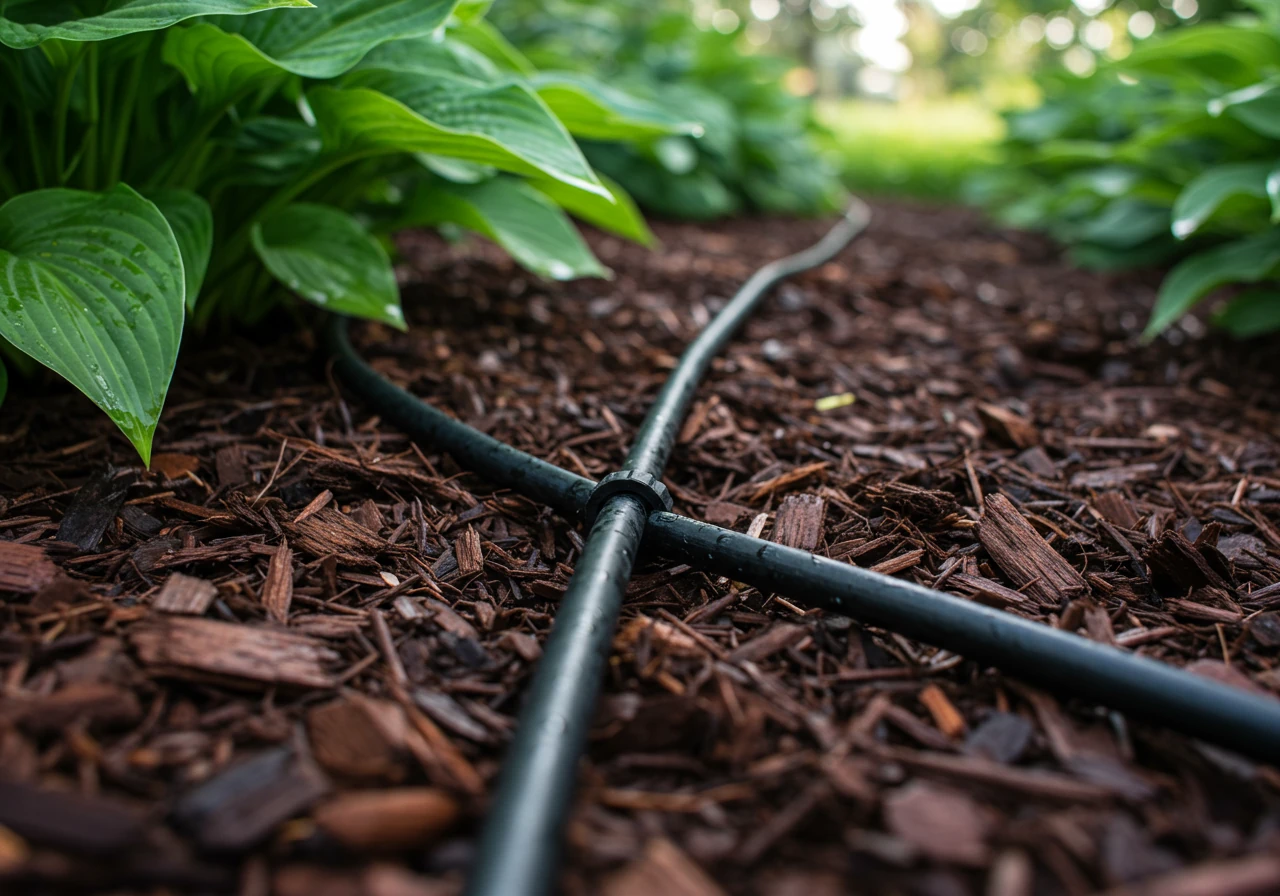
Why Go Deep? The Root of the Matter
Shallow, frequent watering is like giving your plants a tiny appetizer when they need a full meal. It encourages roots to stay near the surface, making them vulnerable when the topsoil dries out fast under the summer sun.
Instead, aim for deep watering. This means soaking the soil thoroughly so water penetrates down 6-8 inches. Doing this less often (maybe once or twice a week, depending on heat and rain) encourages roots to grow deeper, searching for that moisture. Deeper roots mean stronger, more drought-resistant plants – basically, botanical superheroes!
Timing is Everything: The Early Bird Gets the Water
The best time to water is early morning. Why?
- Less evaporation: The sun isn't high yet, so more water actually gets to the roots instead of vanishing into thin air.
- Leaves dry faster: Watering in the evening can leave foliage damp overnight, which is like rolling out the welcome mat for fungal diseases. Morning watering lets the sun dry things off.
Not All Gardens Are Created Equal
Your watering strategy needs to adapt:
- Soil Type: Remember that clay soil we talked about, common in areas like Nepean? It absorbs water slowly. Water gently and for longer periods to avoid runoff and allow penetration. Sandy soil drains fast, so you might need to water a bit more often, but still deeply.
- Plant Needs: Lawns generally need about an inch of water per week (including rainfall). Vegetable gardens and flowering annuals are often thirstier, especially when producing veggies or blooms. Established trees and shrubs usually need less frequent deep watering than newer plantings. Container plants dry out *very* quickly in the heat and may need daily checking. Learn more about lawn needs with our lawn care services.
- Weather: Adjust based on heat waves and rainfall. A good rain means you can skip a watering session!
Estimated Weekly Water Use (Litres per 100 sq ft)
*Estimates vary based on efficiency, soil, and weather.
Choosing Your Watering Weapon
- Hand Watering (Hose/Can): Good control for specific plants or containers. Can be time-consuming for large areas.
- Sprinklers: Best for lawns. Can be wasteful due to evaporation and wind drift. Ensure yours sprays large drops, not fine mist, and waters the lawn, not the sidewalk! Consider efficient systems as part of our landscaping services.
- Soaker Hoses/Drip Irrigation: The efficiency champions! They deliver water slowly and directly to the root zone, minimizing waste. Great for garden beds and vegetable patches.
Is Your Garden Thirsty or Drowning?
Watch for signs:
- Under-watered: Wilting leaves (especially in the morning), dry soil, brown/crispy leaf edges.
- Over-watered: Yellowing leaves (often starting from the bottom), mushy stems, algae/moss growth on soil, maybe even a rotten smell near the base.
Eco-Friendly Sips: Save Water & Money
- Mulch, Mulch, Mulch: A 2-3 inch layer keeps soil cool and dramatically reduces evaporation.
- Rain Barrels: Collect free rainwater from your downspouts – your plants will love it!
- Weed Control: Weeds steal water! Keeping your garden tidy reduces competition. Our Ottawa garden clean up service can help get things under control. Similarly, an effective Kenmore yard cleanup service or keeping things tidy with a Metcalf property cleanup service prevents water waste on unwanted plants.
- Check for Leaks: Dripping hoses or broken sprinkler heads waste gallons.
Mastering wise watering keeps your garden lush, reduces stress (for you and your plants!), and helps manage those summer utility bills. Get it right, and your thriving plants will practically say thank you!
Ensure your plants get the right amount of water, efficiently.
Explore Irrigation & Watering SolutionsPest Patrol & Disease Defense: Protecting Your Plants the Smart Way
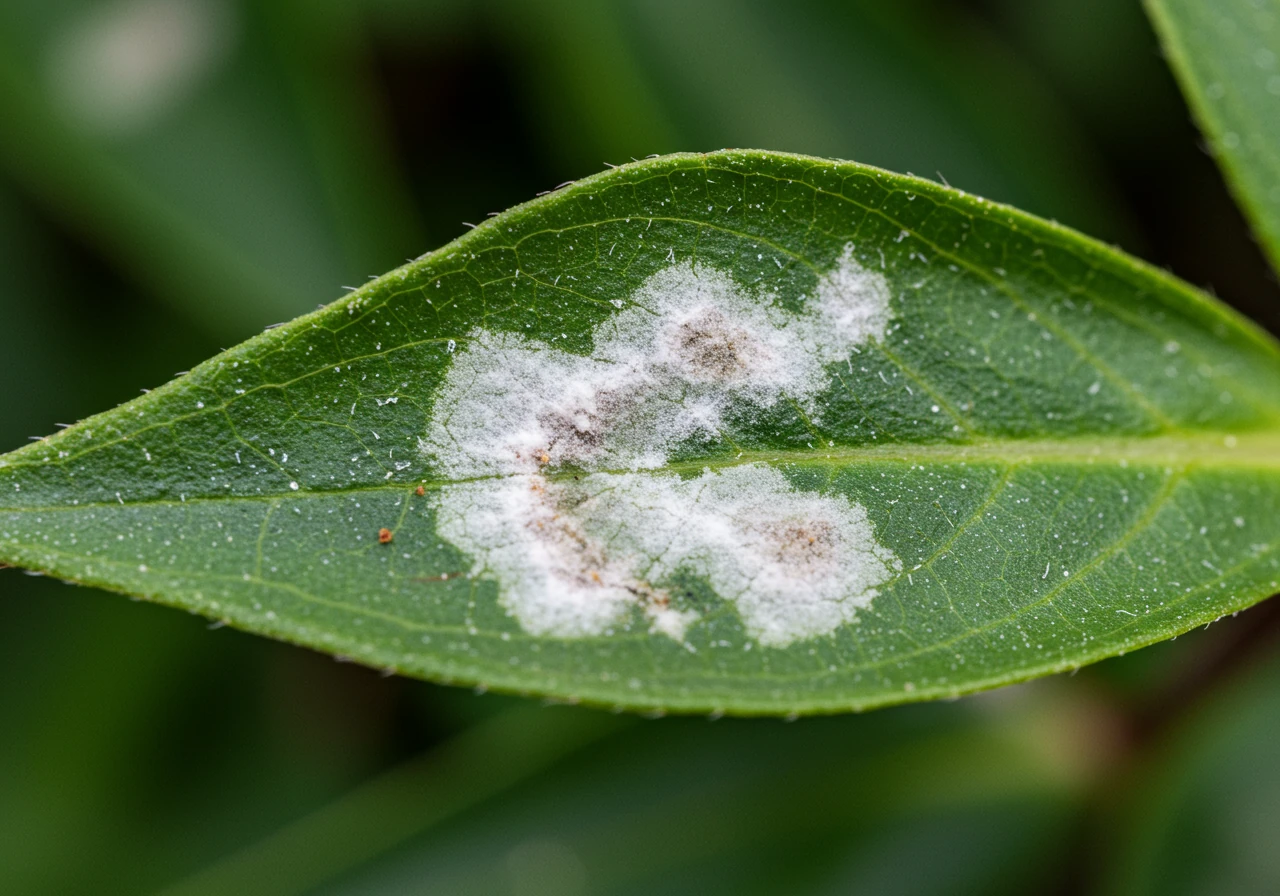
Alright gardeners, let's talk about the uninvited guests – those pesky bugs and annoying plant diseases that try to crash our beautiful Ottawa garden parties. Whether you're tending roses in Barrhaven or nurturing veggies in the suburbs, sooner or later, you'll likely encounter something munching or mildewing where it shouldn't. But don't despair! With a little know-how, you can become a savvy plant protector without resorting to harsh chemicals. Think of it as being a gentle bouncer for your backyard oasis. For expert advice, consider resources like the Master Gardeners of Ottawa-Carleton.
The secret weapon? Integrated Pest Management (IPM). Fancy name, simple idea: use the smartest, least harmful methods first. It starts with being observant – take regular strolls through your garden. Look under leaves, check stems, and get to know what your plants *normally* look like. Catching problems early is half the battle!
Dealing with Common Pests
- Aphids: Tiny pear-shaped insects (often green, black, or yellow) clustering on new growth.
- Defense: Strong water blast, encourage ladybugs, insecticidal soap if needed.
- Slugs & Snails: Slimy trails, munching leaves (esp. hostas).
- Defense: Hand-pick (morning/evening), beer traps, reduce damp hiding spots via cleanup like our Ottawa property cleanup service offers.
- Japanese Beetles: Shiny, coppery-green beetles skeletonizing leaves.
- Defense: Hand-pick into soapy water (early morning). Avoid pheromone traps (attract more!).
- Spider Mites: Tiny pests causing stippling/webs on leaves, worse in hot, dry conditions.
- Defense: Increase humidity, strong water sprays, insecticidal soap/horticultural oil.
Managing Common Diseases
- Powdery Mildew: White, dusty coating on leaves (common in humidity).
- Defense: Ensure good air circulation (spacing/pruning), water soil not leaves, remove infected leaves. Good garden maintenance helps.
- Black Spot: Dark spots on rose leaves (often with yellow halos).
- Defense: Choose resistant varieties for your garden install, meticulous cleanup of fallen leaves (vital!), water early. A thorough fall cleanup, like a Marionville garden clean up service, reduces overwintering spores.
- Fungal Leaf Spots: Various spots on different plants, often worse in wet/humid weather.
- Defense: Improve air flow, avoid overhead watering, remove infected foliage promptly. A general Metcalf property cleanup service can help remove diseased debris.
Prevention is Key!
Healthy plants are naturally more resistant. Focus on:
- Healthy Soil: Amend with compost for strong roots.
- Proper Watering: Deep, infrequent watering at the base.
- Right Plant, Right Place: Choose varieties suited for Ottawa's climate and your site conditions.
- Good Air Circulation: Space plants adequately, prune when needed.
- Garden Hygiene: Regularly remove dead leaves, spent flowers, and weeds where pests/diseases hide. Consistent property clean-up is beneficial.
- Mulching: Helps suppress soil-borne diseases and keeps roots healthy.
Learn more about invasive plants to remove from the Ontario Invasive Plant Council.
Quick Guide: Common Pests & Organic Controls
| Pest | Signs | Organic Control Methods |
|---|---|---|
| Aphids | Small, pear-shaped insects on new growth, sticky honeydew | Strong water spray, insecticidal soap, encourage ladybugs/lacewings |
| Slugs/Snails | Slimy trails, chewed holes in leaves (especially low-growing plants) | Hand-picking, beer traps, diatomaceous earth (use carefully), copper tape barriers |
| Spider Mites | Fine webbing, yellow/bronze stippling on leaves, tiny moving dots | Increase humidity, strong water spray (undersides of leaves), horticultural oil, insecticidal soap |
| Japanese Beetles | Skeletonized leaves (lacy appearance), large metallic green/copper beetles | Hand-pick into soapy water (early morning best), row covers on vulnerable plants |
Dealing with pests and diseases is part of gardening, but it doesn't have to be a losing battle. By being vigilant and using smart, gentle methods, you can keep your green space thriving all summer long!
Feed Your Flora (Carefully!): Summer Nutrition Needs
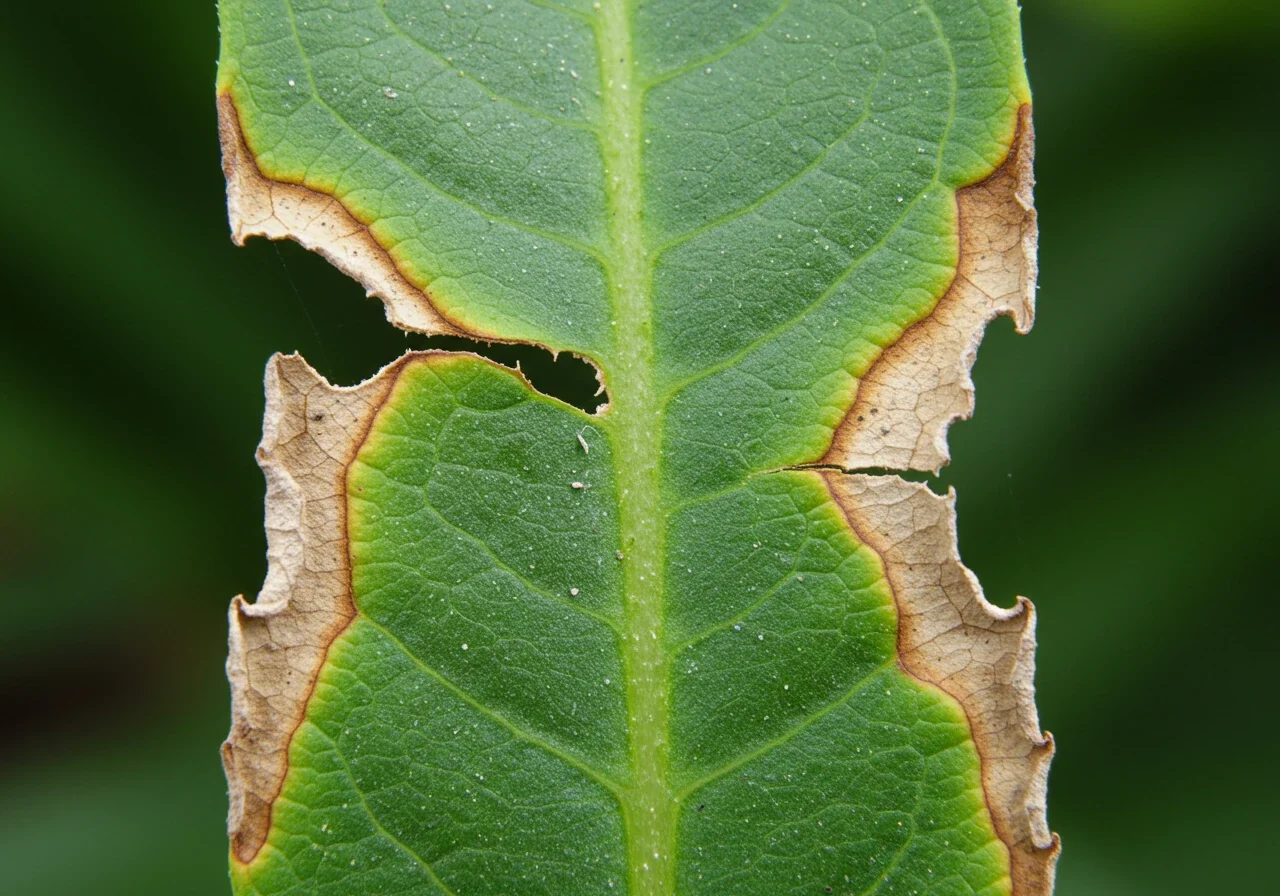
Alright, green thumbs, let's chat about plant food during the summer sizzle here in Ottawa. You might think more heat means plants are hungrier, working overtime like construction crews in July. But actually, when the temperatures really soar, many plants slow down, kind of like us heading for the shade with lemonade. Trying to force-feed them fertilizer then can be like trying to make your teenager eat broccoli when they *really* don't want to – it usually backfires!
Think about it: in areas like Winchester or Vernon, when it's blazing hot, many established perennials, shrubs, and trees go into a semi-dormant state to conserve energy. Pushing fertilizer on them can stress them out even more, leading to dreaded "fertilizer burn" (those sad, crispy brown leaf edges) or weak, leggy growth that just attracts pests. Over-fertilizing is also bad news for your wallet and the environment, as excess nutrients can just wash away. It's generally best to hold off on heavy feeding during peak heat.
So, who *might* appreciate a summer snack, even with the heat?
- Container Plants: Pots dry out fast and nutrients leach out with frequent watering. A diluted liquid organic feed every 2-4 weeks can keep them blooming happily.
- Annual Flowers: These bloom machines (think petunias, marigolds in your garden beds) use a lot of energy producing non-stop colour. A light feeding according to package directions can support their performance.
- Vegetable Gardens: Producing those tasty tomatoes and zucchini takes serious fuel! Follow specific crop needs – they often benefit from regular, light feeding with appropriate vegetable fertilizer.
If you *do* feed certain plants, choose wisely and gently. Forget the harsh chemical cocktails, especially during stress periods. Opt for:
- Organic Matter: Top-dressing with compost or adding worm castings is fantastic. They feed the soil *and* the plants slowly and naturally over time. This really ties back to the foundation of good soil preparation practices. Healthy soil needs less added fertilizer!
- Slow-Release Granular Fertilizers: These release nutrients gradually as you water, significantly reducing the risk of burning sensitive roots. *Always* follow package directions exactly – more is definitely *not* better here – and water thoroughly after applying.
Feeding Caution!
Crucially, never fertilize bone-dry soil or plants that are obviously wilted from heat or drought. Water them first, let them recover for a day or so, and then offer food if needed.
Remember, keeping your garden beds tidy also ensures that the nutrients you *do* provide go to your desired plants, not opportunistic weeds. Utilizing a regular city yard cleanup service can help keep weeds in check and prevent them from stealing valuable resources. Maybe your spring efforts have been overtaken by summer growth? Sometimes a targeted mid-season tidy-up, like what a Metcalf garden clean up service offers, can make a real difference in managing nutrient competition and overall garden health.
Ultimately, observing your plants is your best guide. Are established plants looking pale or yellow despite good watering? Maybe they need a *very light* nutritional boost. Unsure about what your specific landscape needs during the tricky summer months? Getting professional advice tailored to your yard might be the most effective approach. Feel free to reach out and ask questions or share your concerns when you request feedback via our online estimate feedback form. Feed carefully and thoughtfully, friends – your plants (and your wallet) will thank you!
Mulch Magic & Weeding Wisdom: Your Garden's Summer Armor
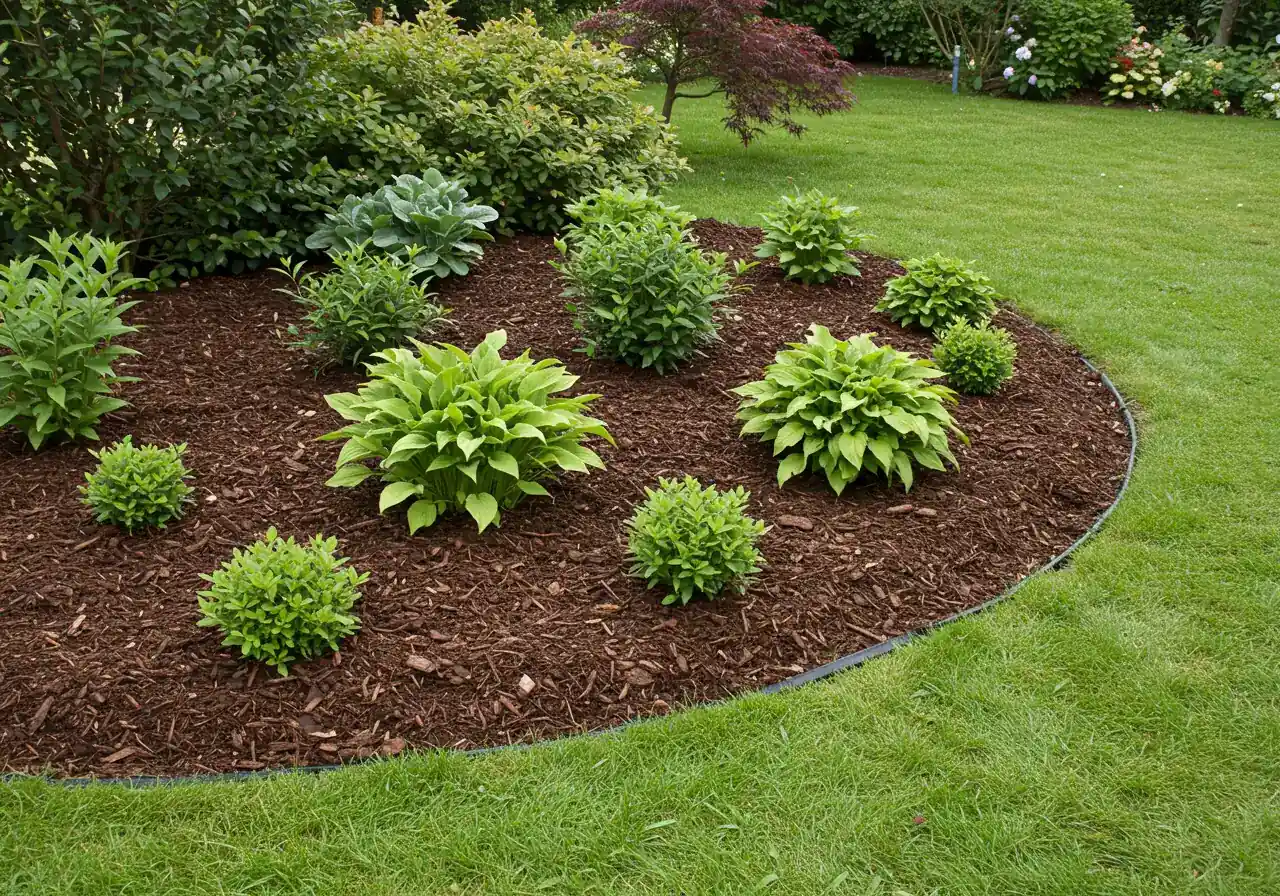
Let’s face it, battling the baking Ottawa sun and those relentless weeds can feel like a full-time summer job! You want to enjoy your beautiful Osgoode backyard, not wrestle with unwanted greenery. That's where mulch and smart weeding come in – think of them as your garden's very own suit of armor against summer stresses. Applying mulch and staying on top of weeds isn't just about looks; it's crucial for plant health and saving you work later.
Mulch: More Than Just a Pretty Topping
Why is mulch so magical? It's a multi-tasking marvel:
- Moisture Lock-In: Reduces water evaporation from the soil, meaning you water less often (your wallet says thank you!).
- Temperature Control: Keeps soil cooler in summer heat and warmer during cool snaps, protecting those precious roots.
- Weed Warrior: A good layer makes it much harder for weed seeds to sprout and take hold.
- Soil Booster (Organic Types): As organic mulches break down, they improve soil structure and add nutrients.
Choosing Your Mulch Shield:
Not all mulches are created equal. Here’s a quick rundown:
- Shredded Bark/Wood Chips: Popular, decomposes slowly, looks natural. Good all-around choice for garden beds and around trees/shrubs. Comes in various colours. See options with our mulching and edging services.
- Compost: Excellent soil conditioner! Can be used as a top dressing or light mulch, especially in veggie gardens. Breaks down faster, enriching the soil.
- Straw: Great for vegetable gardens (keeps mud splash off low-growing crops), but can sometimes contain weed seeds. Less decorative for flower beds.
- Stone/Gravel: Long-lasting, low maintenance, but doesn't improve soil and can absorb and radiate heat. Best for specific landscape designs, not ideal around heat-sensitive plants.
Applying Mulch Like a Pro (It's Easy!)
- Weed First! Remove existing weeds thoroughly, roots and all. Don't mulch over established weeds – they'll just push through.
- Spread Evenly: Apply a layer 2-3 inches deep over the soil surface. Too thin won't suppress weeds effectively; too thick can suffocate roots or become soggy.
- Give Plants Space: Keep mulch pulled back an inch or two from the base of plant stems and tree trunks to prevent rot and pest issues.
Winning the Weed War
Weeds are nature's opportunists, stealing water, nutrients, and light. The key is consistency!
- Strike Early: Pull weeds when they're small and their roots are shallow. It's much easier!
- Get the Root: Try to remove the entire root system. Leaving bits behind means they’ll likely resprout. Use a weeding tool for stubborn taproots.
- Deadhead Weeds: Don't let them go to seed! One seeding weed creates hundreds more problems for next year.
- Mulch is Your Ally: Did we mention mulch? Yes, it's that important for prevention!
- Consider Help: If weeds feel overwhelming, regular help from a City Garden Maintenance Service can keep them under control. This frees up your time and ensures the job gets done right. You can learn more About Us at Clean Yards and our approach to sustainable garden care. Keeping beds weed-free also prevents unwanted guests from invading nearby lawn areas, especially important if you've invested in new turf through services like Clean Yards Sod Installation. If the whole yard needs attention, consider our Marionville property cleanup service or Ottawa yard cleanup service options.
Combining mulch magic with consistent weeding wisdom truly armors your garden. It keeps things looking tidy, reduces plant stress, and makes your summer gardening much more enjoyable. Have specific questions about the best mulch for your particular soil or a persistent weed problem? Don't hesitate to ask when providing details on our Estimate Feedback Form. When considering any service, it's always good to be informed; you can review our straightforward Clean Yards Terms and Conditions anytime. Now go forth and mulch!
Quick Summer Survival Tips
Okay, here are some bite-sized tips to help your garden not just survive, but *thrive* through the Ottawa summer heat without breaking your back (or the bank!). Think of this as your summer garden cheat sheet.
Summer Garden Survival Snapshot:
Water deeply early morning, not daily. Mulch (2-3 inches) to lock in moisture and cool soil. Weed often while they're small. Check for pests regularly. Ease up on fertilizer during extreme heat. Mow lawns higher. Keep containers hydrated and the garden tidy. Need a hand? Reach out for professional help!
- Water Smart, Not Hard: Remember, deep and infrequent watering is better than a daily sprinkle. Aim for early morning sessions to minimize evaporation and give leaves time to dry. Check the soil moisture first – if it’s damp a few inches down, your plants are likely fine!
- Mulch is Your BFF: Seriously, a 2-3 inch layer of good mulch keeps soil cool, holds moisture, and suppresses weeds. It’s like sunscreen and a comfy blanket for your plant roots. Need help choosing the right type for your space? Check out some options under guidance on landscaping material selection.
- Weed Little and Often: Don't let them get comfortable! Pull weeds when they're small, especially after rain when the soil is soft. Letting weeds take over stresses your desirable plants and just looks messy. A quick tidy-up makes a huge difference. A city garden clean up service can tackle this efficiently.
- Pest Check-Ins: Take a stroll and peek under leaves regularly. Catching pests like aphids or signs of disease early makes them much easier to manage. A strong spray of water often works wonders on aphids!
- Easy on the Fertilizer: Remember how plants slow down in extreme heat? Avoid pushing heavy fertilizers during heat waves. If you *do* feed containers or hungry veggies, use diluted liquid feed or slow-release options, and *always* water well first.
- Container Care: Pots and hanging baskets dry out super fast in the sun and wind. Check them daily, sometimes even twice on scorching days. They rely entirely on you for water and nutrients!
- Lawn Love: Mow higher! Keeping grass blades a bit longer (around 3 inches) helps shade the soil, conserve water, and prevents scalping during dry spells. Leave the clippings (grasscycling) to return nutrients. More tips at Lawn Care Services.
- Tidy Up Debris: Don't let fallen leaves, spent blooms, or other debris pile up. This stuff can harbor pests and diseases, especially in damp conditions. Keeping things neat is easier with regular attention, but if things get away from you, a professional city property cleanup service can quickly restore order.
- Know When to Ask for Help: Feeling overwhelmed or unsure? Don't let small problems become big ones! Sometimes expert advice or a helping hand is the best investment. You can learn more About Us and our approach to helping Ottawa homeowners enjoy their yards. If you have specific questions or need assistance, don't hesitate to get in touch with us directly.
Follow these quick tips, and you'll spend less time worrying and more time enjoying your beautiful Ottawa summer garden!
Mid-Summer Garden Check Timeline
Early July: Water & Weed Check
Assess watering needs as heat increases. Perform thorough weeding before summer vacations. Check mulch depth.
Mid-July: Pest & Disease Patrol
Inspect vulnerable plants (roses, veggies) closely. Deadhead annuals & perennials to encourage more blooms. Lightly feed containers/veggies if needed.
Late July: Monitor & Adjust
Observe plant stress signs during heat waves. Adjust watering frequency. Check lawn for grub damage or dryness. Plan any late summer cleanup needed via services like Ottawa yard cleanup.
Early August: Pruning & Planning
Lightly prune summer-flowering shrubs *after* blooming (if needed). Start thinking about fall planting or cleanup tasks. Ensure irrigation systems like those checked in Manotick are still working well.
FAQs: Your Ottawa & Kars Summer Garden Questions Answered
Oh, the dreaded patchy lawn! Besides heat stress, common culprits in Ottawa include lawn grubs munching roots (look for loose turf), fungal diseases (often worse in humidity), or even compacted soil, especially in high-traffic areas. Try digging gently in a brown spot to check for C-shaped grubs. Consistent deep watering helps, but persistent issues might need specific treatment or aeration. You can find more about lawn care solutions here.
You want tough beauties? Great idea! For sunny spots near Kars or Greely, consider Daylilies (Hemerocallis), Coneflowers (Echinacea), Sedum 'Autumn Joy', or ornamental grasses like Feather Reed Grass (Calamagrostis). These handle heat well once established, tolerate various soils common in our area, and don't demand constant fussing. They offer great colour and texture with less work! We can help with plant selection during a garden install.
Generally, once a year is enough, ideally in spring after cleaning up but before the summer heat really hits. A good 2-3 inch layer usually lasts the season. If you notice thin spots or lots of weeds poking through mid-summer, a light top-up can help. Proper application is key – check out our professional tips for effective mulching and edging services to maximize benefits.
Don't panic just yet! Many leaf spots on veggies in places like Metcalfe or Osgoode are minor, caused by fluctuating moisture or temporary nutrient issues. However, some *can* be fungal or bacterial diseases. Remove affected lower leaves promptly, ensure good air circulation, and avoid wetting foliage when watering. If it spreads rapidly or affects the fruit, you might need more specific diagnosis. Keeping gardens healthy often involves regular garden clean-up.
Good question! For most flowering shrubs in our region (like spireas or potentilla that bloom on new wood), light trimming *after* they finish flowering is okay to maintain shape. Avoid major pruning in late summer, as this can encourage new growth that won't harden off before winter. For evergreens or hedges needing shape, a light shear mid-summer is generally fine. You can read more about summer shrub pruning tips here.
Absolutely! Summer can get busy, and gardens can quickly feel out of control, whether you're in Barrhaven or Kars. We specialize in helping homeowners reclaim their yards. Take a look at some inspiring Clean Yards landscape transformations to see what's possible. Feel free to contact us directly to discuss your needs; rest assured, we respect your information as detailed in our Clean Yards Privacy Policy.
Conclusion: Enjoy a Beautiful Kars Summer Garden, Stress-Free!
So there you have it! Your roadmap to a Kars summer garden that looks amazing without requiring a degree in plant psychology or a second mortgage for replacement plants. By watering wisely, keeping a friendly eye out for pests (the tiny party crashers!), feeding appropriately, and embracing the magic of mulch, you're setting yourself up for success. This little bit of preventative gardening TLC really is the secret sauce to avoiding bigger problems and *actually* enjoying your beautiful outdoor space.
But let's be honest, sometimes summer flies by, and battling weeds in the Ottawa humidity isn't exactly peak relaxation. If your garden to-do list feels more daunting than delightful, why not let us take the reins? Our landscaping and garden care team loves getting their hands dirty so you don't have to. We offer stress-free solutions for homeowners throughout Kars, Russell, Embrun, Winchester, Kenmore, Vernon, and the wider Ottawa area.
Ready to kick back and enjoy a beautiful yard, truly stress-free?
Request Your Free Estimate Today!Let us handle the hard work, so you can focus on the important things – like perfecting your lemonade recipe. Enjoy your gorgeous Kars summer garden!

